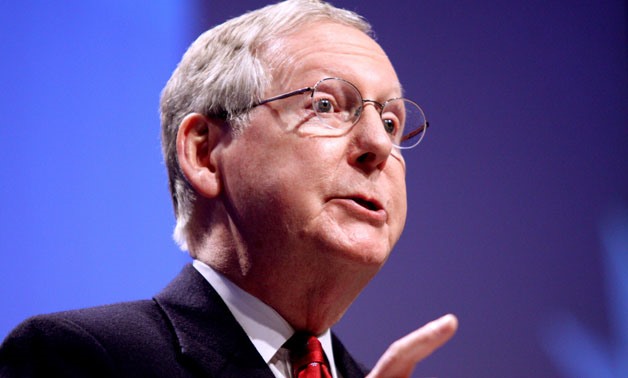
US Senate Majority Leader Mitch McConnell- CC via Flickr- Gage Skidmore
Washington - 23 June 2017: US Senate Republicans on Thursday unveiled a revamped health care plan aimed at fulfilling President Donald Trump's pledge to repeal Obamacare, but a revolt by four conservatives put the bill in immediate jeopardy.
Democrats formed a united front against the controversial measure, blasting it as a "war on Medicaid," the health care program for lower income Americans, and calling it worse than one that passed the House of Representatives in May.
For the past seven years, Republicans have worked to repeal of the landmark health reforms of Trump's Democratic predecessor Barack Obama. Members from both parties agree the repeal effort has never been closer to fruition.
Senate Republicans are painting the new plan as less austere than the House bill which, according to a forecast by the non-partisan Congressional Budget Office (CBO), would leave 23 million fewer people insured than under current law.
But the 142-page draft would allow states to drop several benefits which are now mandated, such as maternity care and hospital services, and also would abolish the requirement for most Americans to have health insurance.
It however delays cuts to the Medicaid program and maintains for two years the tax credits included in the Affordable Care Act (ACA) -- commonly known as Obamacare -- to help lower-income Americans purchase coverage.
Senate Majority Leader Mitch McConnell unveiled the bill, drafted in secret by a handful of lawmakers and aides, at a closed-door session with party faithful.
Four Republicans quickly came out in opposition -- Ted Cruz, Mike Lee, Ron Johnson and Rand Paul -- while two more Republicans have openly expressed serious concerns.
That poses a problem for the party leadership. Republicans hold 52 out of 100 Senate seats, so they can afford only two defections.
Asked what would need to be included in the bill to get him on board, Paul said: "It has to look less like Obamacare light -- it's got to look like what we promised."
"It looks to us like the Obamacare subsidies will remain in place and... we think that the spending actually may exceed Obamacare spending in the next two years," he added.
Lawmakers will be "looking to see if there are things that we can do to refine it, and make it more acceptable to more members in our conference, to get to 50," Senator John Thune said.
"Right now the challenge is -- how do we get to 50."
Trump, who campaigned heavily on a pledge to dismantle Obamacare, remained confident.
"It's going to be very good," the president said. "Little negotiation, but it's going to be very good."
But the man who championed the Affordable Care Act offered a scathing critique of the new bill just hours after its release.
Obama called the bill "a massive transfer of wealth from middle-class and poor families" to the very rich that would raise costs, reduce coverage, roll back protections and "ruin Medicaid as we know it."
Even if the measure is ultimately tweaked through amendments in Congress, it "cannot change the fundamental meanness at the core of this legislation," the former president warned in a Facebook post.
McConnell said a fresh CBO score on the new bill was expected next week, and there will be "robust debate" on the floor.
He also said there would be an open amendment process to allow changes. He wants a final vote by the end of the month.
Any new Senate bill would have to be reconciled with the House version.
Top Senate Democrat Chuck Schumer blasted the new bill as "heartless," warning it would eventually cut Medicaid even more steeply than the House legislation, which slashes it by $800 billion over a decade.
While Trump reportedly called the House bill "mean" and wants to see a bill with heart, Schumer said "the Senate bill may be meaner."
The new legislation would eliminate federal funding for Planned Parenthood, a non-profit health organization that Trump's administration has targeted for cuts because it provides abortion services.

Comments
Leave a Comment